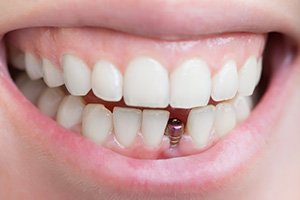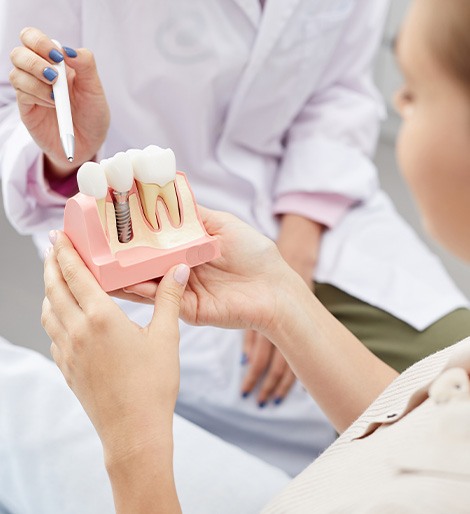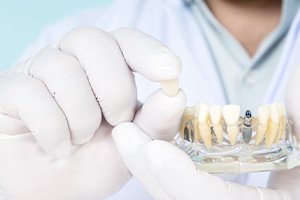Dental Implants Allen
Replacing Teeth with Premier Prosthetics
At Downtown Dental, Dr. Randhawa is skilled and equipped to complete the entire dental implant process in-house. Providing premier prosthetics that are viewed as the gold standard of tooth replacement, he will work with you to determine the type of restoration you need to enjoy a fully restored smile that can last a lifetime. To find out how you can take advantage of this unique solution, call our office to schedule a consultation for dental implants in Allen.
Why Choose Downtown Dental for Dental Implants?
- Dental Implant Process Completed In-House
- All-on-4 Dental Implants for Patients with Less Jawbone Density
- Highly Qualified Dentist & Dental Team
What Are Dental Implants?

Dental implants are not designed to solely replace the visible portions of teeth. They extend below the gumline to replicate the roots so that faces do not sag or collapse. A common occurrence among those suffering from tooth loss, bone resorption can be halted once dental implants are in place. By fusing with bone tissues, these prosthetics support all types of restorations (i.e., crown, bridge, or denture) and can remain in place for decades or in many cases, a lifetime.
The 4-Step Dental Implant Process

Dental implants are more complex than other restorative options, so getting them takes months. Still, you needn’t worry – the posts have benefits worth this time and effort. Downtown Dental even places implants in-house to ensure you get the best results. With Dr. Randhawa supervising your treatment, you can expect your new teeth to look and feel amazing! As for the implant process itself, it has four phases: consultation, surgery, osseointegration, and delivery of the final restoration.
Initial Dental Implant Consultation

At the start of the dental implant process, you’ll meet Dr. Randhawa for a consultation. This session allows us to learn your smile goals, oral health background, and other key factors. By closely assessing them, we can see if dental implants suit you and adjust your treatment plan.
Please don’t panic if we initially decide you don’t qualify for dental implants. As it turns out, you can become a good candidate later through extra dental work – gum disease therapy, tooth extractions, etc. Such procedures would make your mouth strong enough to support implant posts.
Dental Implant Surgery

As stated before, our office places dental implants in-house. That means Dr. Randhawa himself will oversee your surgery, using advanced methods and tools throughout the process. You should expect fantastic results you can proudly show to friends and family.
Our practice’s dental implant surgery involves a few key steps. Firstly, Dr. Randhawa will numb the treatment site to prevent aches during care; you’ll only feel a slight pressure as he works. He’ll then make a small incision in your gums to make room for the final implant. Once he’s done, he and his team will precisely place the implant and suture your gums shut. Dr. Randhawa will conclude treatment by putting a protective cap over your now-set post.
Dental Implant Osseointegration & Abutment

Your dental implant will slowly start to fuse with your jaw after surgery. Through this 4–6-month process (i.e., osseointegration), it’ll become firmly rooted in your jawbone. The result will be a new “tooth” that’s secure, stable, and a permanent part of your mouth.
Once you’ve healed from implant fusion, you’ll undergo a follow-up surgery. This procedure will place an abutment (i.e., a metal connector) on your implant that secures the final restoration. As for this latter component, it’ll be crafted while you recover from the abutment work.
Delivery of Dental Implant Restoration(s)

Dr. Randhawa will deliver your final restoration at the end of your implant treatment. Put another way, he’ll set a dental prosthetic that “matches up” with how many teeth you’ve lost. This device could be a dental crown, dental bridge, or implant denture; its nature will depend on your situation.
Thankfully, fitting your final restoration shouldn’t take a long time. That step can usually be done by applying some dental cement to your abutment. Once the restoration is secure, we’ll then make last-minute changes to ensure its quality and let you enjoy your restored smile!
Benefits of Dental Implants

Dental implants continue to gain popularity as a resilient solution to replacing missing teeth, with an estimated 500,000 placed annually. Unlike dentures or dental bridges, they are embedded into the jawbone. This unique placement offers many advantages over other restorative methods. With implants in place, you can improve your overall and oral health, boost your confidence, and enjoy your daily quality of life.
Continue reading to learn more about the benefits they provide, and feel free to contact us for additional information.
Day-to-Day Benefits

When teeth go missing, tasks that once were second nature suddenly become much more challenging. You rely on a complete set to thoroughly grind your food, speak different words, and smile authentically without worrying you’ll be judged for how you look. Dental implants can help by:
- Restoring chewing power. Patients with these prosthetics enjoy 70% to 90% of their original chewing force, compared to the 10% to 30% that dentures provide.
- Speaking clearly. They act as artificial teeth you can press your tongue against so you can enunciate various sounds and be understood more easily.
- Looking natural. They are customized to look just like your teeth, so no one can tell the difference, and you can set self-consciousness aside.
- Boosting confidence. Unlike dentures and dental bridges, they’re thoroughly rooted and aren’t likely to slip out of place in the middle of a meal or conversation, so you have no reason to feel insecure.
Health Benefits

Not only can dental implants contribute to your daily quality of life, but they also support your oral condition in the following ways:
- Easy to care for. Maintaining your restorations is as simple as brushing and flossing twice daily, along with visiting Dr. Randhawa every six months for a routine checkup and cleaning.
- Support your jawbone. Without roots to stimulate new bone growth when you bite down, your jawbone begins to thin, which can eventually contribute to additional tooth loss. The titanium rod of your implant keeps your jaw active and healthy.
- Prevent dental drifting. Your remaining teeth will likely shift out of alignment to try to fill in empty spaces left behind, which can be avoided if you replace your missing tooth.
- Preserve dental health. Because they function as sturdy standalone structures that aren’t pressed against your gum tissue all day, they aren’t as likely to cause gum disease or tooth decay as dentures or dental bridges.
Long-Term Benefits

Some of the greatest advantages of these restorations aren’t as immediately obvious but are just as important. With dental implants, you enjoy many long-term benefits like:
- Durability. They’ve been known to last 25+ years, which could potentially be the remainder of your natural life.
- They have an incredibly high success rate of 95% or more, even up to 10 years after they were initially placed in your jawbone.
- Cost-efficiency. Although they may be more expensive upfront, you’re less likely to need to repair or replace them. Plus, you don’t need to invest in adhesive creams, soaking solutions, and other accessories like dentures and bridges.
Understanding the Cost of Dental Implants in Allen

There are a lot of factors that go into the overall price of a dental implant treatment in Allen. But we don’t want you to have to do rocket science to get a sense of what you might pay! To make it easier for our patients to understand the cost of dental implants, we’ve put together useful financial information below, including how we might be able to help you save money. Give it a readthrough, and please let us know if you have any questions or concerns!
Preliminary Treatments & Dental Implant Surgery

By “preliminary treatment,” we simply mean any treatment you might need to eliminate harmful oral conditions before receiving your implants. Conditions like gum disease and infection can quickly lead to implant failure if left unaddressed, so we always make sure to conduct a thorough oral examination and treat potential complications before placing any dental implants.
The dental implant surgery itself is actually a separate procedure from the placement, and is therefore associated with a separate cost. Keep this in mind when planning out your budget!
The Parts of Your Dental Implant

Your individual dental implant could be more or less expensive as well, depending on factors such as:
- The number of implants you’re receiving. More implants means more expenses.
- The complexity of your restoration. A single tooth replacement is likely to be less expensive than an implant denture, for instance.
- Implant materials. Though titanium is a popular material choice for dental implant posts, there are other options available, like zirconia, that are associated with different costs.
- The manufacturer. If you’d like to know more about which brands we use, don’t hesitate to ask during your consultation.
How Dental Implants Can Save You Money

Truthfully, dental implants are one of the more costly tooth replacement options – upfront, that is! Over time, they can actually save you money. Dentures, for example, have to be replaced roughly every 7 to 10 years. With proper care, a dental implant will last you for 30 years or more, reducing what’d you spend on travel, repairs, and replacements. Plus, since they connect to your jawbone like a natural dental root, they do a much better job of preserving your bone mass, sparing you from costly treatments down the line.
Does My Dental Insurance Cover Dental Implants?

Dental insurance typically covers at least part of the costs associated with dental implant treatment. While they may not pay for the individual implants, they’re more likely to foot the bill for preliminary treatments. Let us know if you need help deciphering your dental insurance benefits, and we’ll help you get the most out of your policy.
Making Dental Implants Affordable

Those without dental insurance might be interested in a CareCredit payment plan. Our trusted partners can take your overall treatment costs and break them down into smaller monthly payments – all at little-to-no interest!
If you’d like to know more about dental implants or discuss the finer details about how much your treatment will cost, give us a call. Dr. Randhawa is currently offering free dental implant consultations, so you can meet with him without worrying about adding to your overall expenses.

